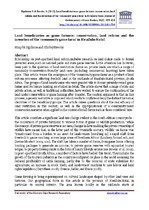Land beneficiaries as game farmers: conservation, land reform and the invention of the 'community game farm' in KwaZulu-Natal
Abstract
Scholarship on post-apartheid land reform includes research on land claims made to formal protected areas, such as national parks and state game reserves. Little attention has however, been paid to the question of land restitution claims on private lands, on which a range of nominally ‘conservation-friendly’ land-uses (including commercial hunting) have taken place. This article traces the emergence of the ‘community game farm’ as a product of land reform processes affecting freehold land in the midlands of KwaZulu-Natal province, South Africa. Two groups of land beneficiaries who were granted title to former privately owned game farms used for leisure hunting are studied in detail. The article shows that a range of state and private actors, as well as traditional authorities, have worked to ensure the continuation of the land under conservation or game farming after transfer. The central argument is that in this process, a generic narrative is imposed which works to conflate or deny the distinct historical identities of the beneficiary groups. The article raises questions about the real efficacy of land restitution in this context, as well as the appropriateness of a community-based conservation narrative when applied in the context of small farms such as those considered here.

